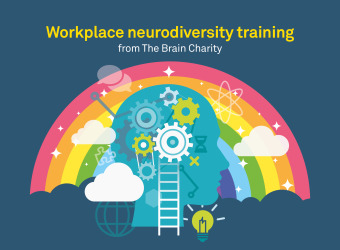
How to support neurodivergent employees and create a neuroinclusive workplace
How to create a neurodiverse and neuroinclusive workplace where everyone can thrive
To mark Neurodiversity Celebration Week, we are sharing a series of blogs which champion neurodiversity. Here, we are sharing ways workplaces can support and celebrate neurodivergent employees.
Neurodiversity refers to natural variations in the way people’s brains are wired and how they process information. This can include neurological differences and conditions such as autism, ADHD and dyslexia.
While neurodivergent individuals have unique strengths and perspectives, they often face barriers in the workplace due to a lack of understanding and accommodation.
Encouraging neurodiversity in the workplace can benefit both individuals and the organisation as a whole, just like encouraging other types of organisational diversity. Here are some ways that employers can create a more inclusive environment for neurodivergent individuals.
Recognise the strengths of neurodivergent individuals
Neurodivergent individuals often possess unique skills and strengths that can benefit the workplace.
For example, individuals with ADHD may be able to hyperfocus on tasks, while autistic people may have strong attention to detail and pattern recognition skills and those with dyslexia are often visual thinkers with excellent problem-solving skills.

Employers should identify and leverage these strengths by providing opportunities for individuals to excel in areas where they are naturally talented.
Using strengths-based approaches, such as task delegation and skill-based job matching, can help individuals use their strengths and feel valued and engaged in the workplace.
Provide flexible working arrangements for neurodivergent staff
Many neurodivergent individuals have specific needs when it comes to their work environment. For example, someone with sensory processing issues may find it difficult to work in a noisy, crowded office.
Employers should consider providing flexible work arrangements, such as remote work or flexible hours, to accommodate these needs.
Use clear communication
Some neurodivergent individuals may struggle with social cues and understanding unwritten rules.
Good employers and managers should provide clear communication and expectations to all employees, regardless of any neurological condition.
This can include providing written instructions as well as verbal, avoiding metaphors or idioms, and sharing feedback in a direct, constructive manner.

Create a workplace culture that is supportive of neurodiversity
Employers should create a culture that values diversity and promotes inclusion. This can include providing training on neurodiversity, encouraging open communication and celebrating diversity through events and employee recognition.
By creating a supportive culture, neurodivergent individuals will feel more comfortable bringing their whole selves to work and contributing to the organisation’s success.
Provide accommodations and reasonable adjustments for neurodivergent staff
Employers should provide accommodations to neurodivergent individuals to help them succeed in the workplace. This isn’t just a ‘nice to have’ – legally, employers must provide and fund reasonable adjustments for anyone with a disability.
A reasonable adjustment is a change that must be made to remove or reduce a disadvantage related to:
- An employee’s disability when doing their job
- A job applicant’s disability when applying for a job
This can include assistive technology, such as screen readers or noise-cancelling headphones, as well as specific accommodations tailored to each individual’s needs.
By providing these accommodations, employers can ensure that neurodivergent individuals are able to perform their job to the best of their abilities.
Build awareness and understanding of neurodiversity in the workplace

One of the most important steps in incorporating neurodiversity in the workplace is to build awareness and understanding of neurodivergent conditions.
This includes providing education and training for managers and employees to increase awareness of the strengths and challenges of neurodivergent individuals, as well as the accommodations and support that may be needed.
Create a sensory-friendly work environment for neurodivergent colleagues
Some neurodivergent individuals are sensitive to environmental stimuli, such as noise, light and smell.
Creating a sensory-friendly office environment can help neurodivergent individuals feel more comfortable and productive in the workplace.
This may include providing noise-cancelling headphones, adjusting lighting, reducing strong smells, and allowing for breaks in a quiet space.
Offer mentoring and support

Mentoring and support programmes like The Brain Charity’s employment projects can provide valuable support and guidance for neurodivergent individuals who are currently working or hoping to get into or return to work.
This may include pairing individuals with a mentor or coach, providing access to support groups or resources, and offering extra opportunities for training and development.
Create a neuroinclusive workplace
In conclusion, incorporating neurodiversity in the workplace can benefit both individuals and organisations. By recognising the strengths of neurodivergent individuals, providing flexible work arrangements, using clear communication, creating a supportive culture, and providing accommodations, employers can create a more neuroinclusive workplace where everyone can thrive.
The Brain Charity now runs bespoke neurodiversity training for employers. Click here to find out more.
Categories: Advice, Neurodiversity
Published: 14 March 2023














